Since the inception of online dating, many have praised it as leveling the playing field for daters, expanding the dating pool and helping people “put themselves out there” in new ways. But others have raised questions about its effect on relationships, daters and society at large: Do online daters feel safe? Is the “dating pool” different than it otherwise would be, and what is the impact on daters’ experiences? Are people being judged too quickly or getting the chance to know others?
The survey set out to understand what Americans think about the online dating environment, regardless of whether they themselves have used the sites or apps. It finds Americans divided on online dating’s impact on relationships: More say online dating has made finding a long-term partner easier than harder and that people on the platforms have too many choices rather than too few. But at the same time, many are skeptical or unsure that the algorithms platforms use match people in a way that could lead to love.
It also sheds light on Americans’ divided views on safety issues amid a broader conversation about protecting daters, with views on the safety of dating sites and apps varying by age, gender and formal education. A majority support requiring background checks for users, as these types of checks are being explored as an option by some platforms.
Majority of Americans say online dating has had a neither positive nor negative impact on dating and relationships

When asked about the effect these platforms have had on dating and relationships, about one-in-five each describe their effect as mostly negative (21%) or mostly positive (18%). But the largest share – about six-in-ten (59%) – say dating sites and apps have had neither a positive nor a negative effect.
The Center found a similar pattern when asking this question in 2019 – though the share who says its impact is neither positive nor negative has grown from 50% then to 59% now.
Across demographic groups, about half or more Americans believe online dating’s impact has been neither positive nor negative. However, there is some variation. Adults with more formal education, for example, are more likely to say online dating has had a mostly positive effect. One-in-four Americans with a bachelor’s degree or more say this, compared with 17% of those with some college and 13% of those with a high school diploma or less.
Among those who have ever used dating platforms, there is no consensus on whether these sites and apps have had a negative or positive effect, with 26% saying each. Those who have never used dating sites or apps are more likely than those who have to be agnostic about their effect on society.
Americans roughly twice as likely to say online dating has made finding a long-term partner easier rather than harder
Another often-pondered question in the online dating world is whether dating apps and sites can lead to long-term relationships or marriages. Americans lean toward them making the task easier: Some 42% of U.S. adults say dating sites and dating apps have made finding a long-term partner or spouse at least a little easier. About half as many (22%) instead say these platforms have made finding a long-term partner or spouse at least a little harder. Yet about a third say that these platforms have made no difference in this respect.
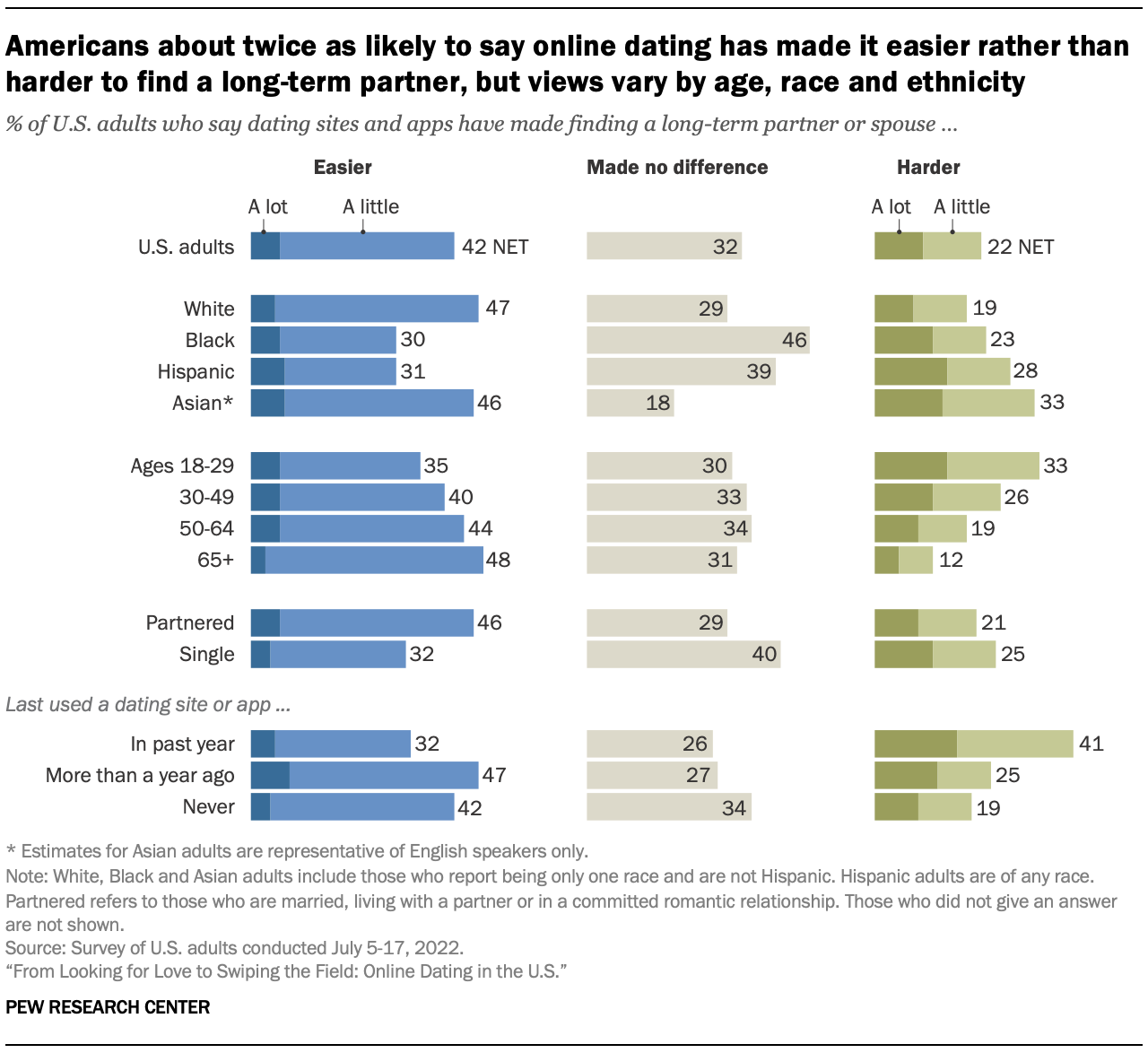
Not all age groups lean toward saying online dating makes finding a partner easier, though. Adults under 30 are divided on this topic: Roughly the same shares of 18- to 29-year-olds say dating sites and apps have made finding a long-term partner or spouse easier (35%) and harder (33%). By comparison, older age groups lean toward online dating making this easier.
These views also vary by race and ethnicity. White or Asian adults are more likely than Black or Hispanic adults to say online dating has made finding a long-term partner easier. At the same time, Asian adults are also more likely than White or Black respondents to say online dating has made this harder.
When it comes to having used these sites and apps, those who have done so in the past year have more negative views on this topic compared with their counterparts. About four-in-ten adults who have used a dating site or app in the past year say these platforms have made finding a long-term partner more difficult for people generally. Among less recent online dating users this number drops to one-quarter, and to 19% among those who have never online dated.
Those who are partnered – regardless of how they met this person or whether they have used dating sites and apps – are especially positive about online dating’s impact in this way. Some 46% say it’s made finding a spouse or partner easier, compared with 32% of those who are single.
Americans are about three times as likely to think people have too many choices on dating sites than too few
Online dating promises to bring potential connections to people’s fingertips. But does it put too many options in front of them, leaving users overwhelmed by choice or always searching for a better match? Or does it still leave them lacking for enough choices for dating?
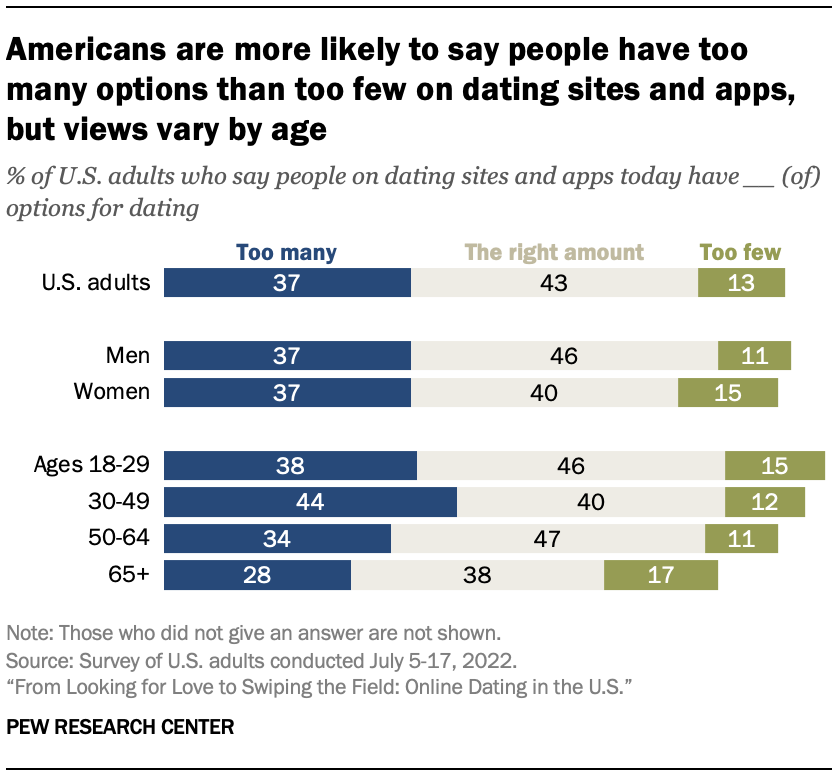
About four-in-ten Americans (43%) say people on dating sites and apps have the right amount of options for dating. Some 37% think choices are too plentiful, saying people have too many options for dating on these sites and apps. Just 13% of Americans say there are too few options on them.
Adults ages 30 to 49 are most likely to say that people have too many options on the platforms, followed by 18- to 29-year-olds and 50- to 64-year-olds. Those 65 and older are least likely to say this. (Some 8% of those 50 to 64 and 17% of those 65 and older did not provide an answer to this question.)
There are only modest differences by gender overall when it comes to options people have on the platforms. Men are slightly more likely than women to say people have the right amount of choices, and less likely than women to say people have too few.
Those who have used dating sites and apps are slightly more likely to say there are too few options on them than those who have never used one (17% vs. 12%). And there are some differences among those who have experience on the platforms. Black online dating users are 12 percentage points more likely than White online dating users to say there are too few options (26% vs. 14%), as are users with some college or less formal education compared with those with a bachelor’s degree or higher (19% vs. 14%). And LGB online dating users are slightly more likely than straight online dating users to think people on the platforms lack choices (23% vs. 16%).
Majority of adults are skeptical or unsure that algorithms can predict love; about one-in-five think they can
A unique aspect of the online dating environment, compared with meeting people in person, is the method behind the matches. Computer programs, or algorithms, are used by many dating sites and apps to decide which profiles someone should see. These algorithms can learn to match people according to things like common interests, location, or how other users have engaged with someone’s profile.
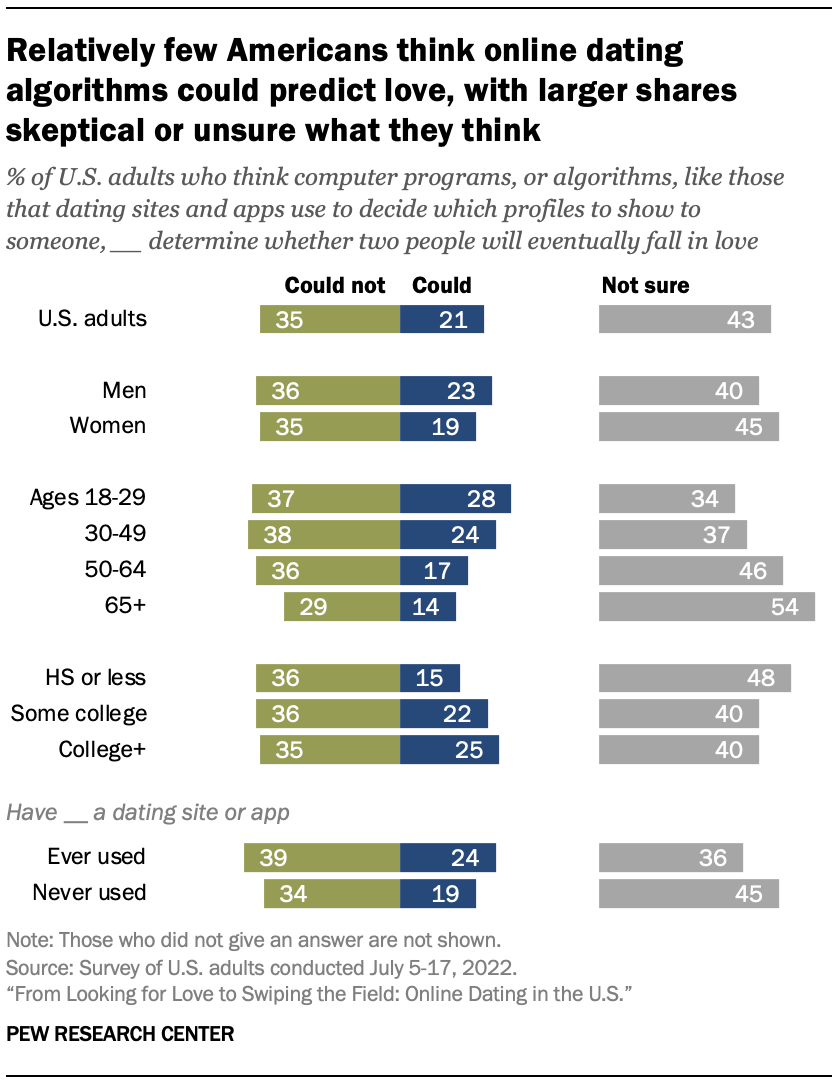
More are skeptical than optimistic when asked if the algorithms like those used to display dating profiles to people could determine whether two people could fall in love. Some 35% of Americans think algorithms could not do this versus a smaller share (21%) who think the algorithms could. The largest share – 43% – is not sure.
There are some differences in these views across demographic groups. For example, adults with a bachelor’s degree or more education are more likely to say algorithms could predict love than adults who have a high school diploma or less.
Adults under 50 are also more likely to have an opinion on this either way – whether optimistic or skeptical – than older Americans. Those 50 and older are far more likely than their younger counterparts to say they are not sure.
While those who have used the platforms are only slightly more likely than those who have not to say algorithms could predict love, there are larger differences among online dating users based on their experiences.
Online dating users who say their experiences have been very or somewhat positive are more likely to think algorithms could predict love than users who describe their experiences as negative (30% vs. 18%).
Americans are divided in their views of online dating’s safety
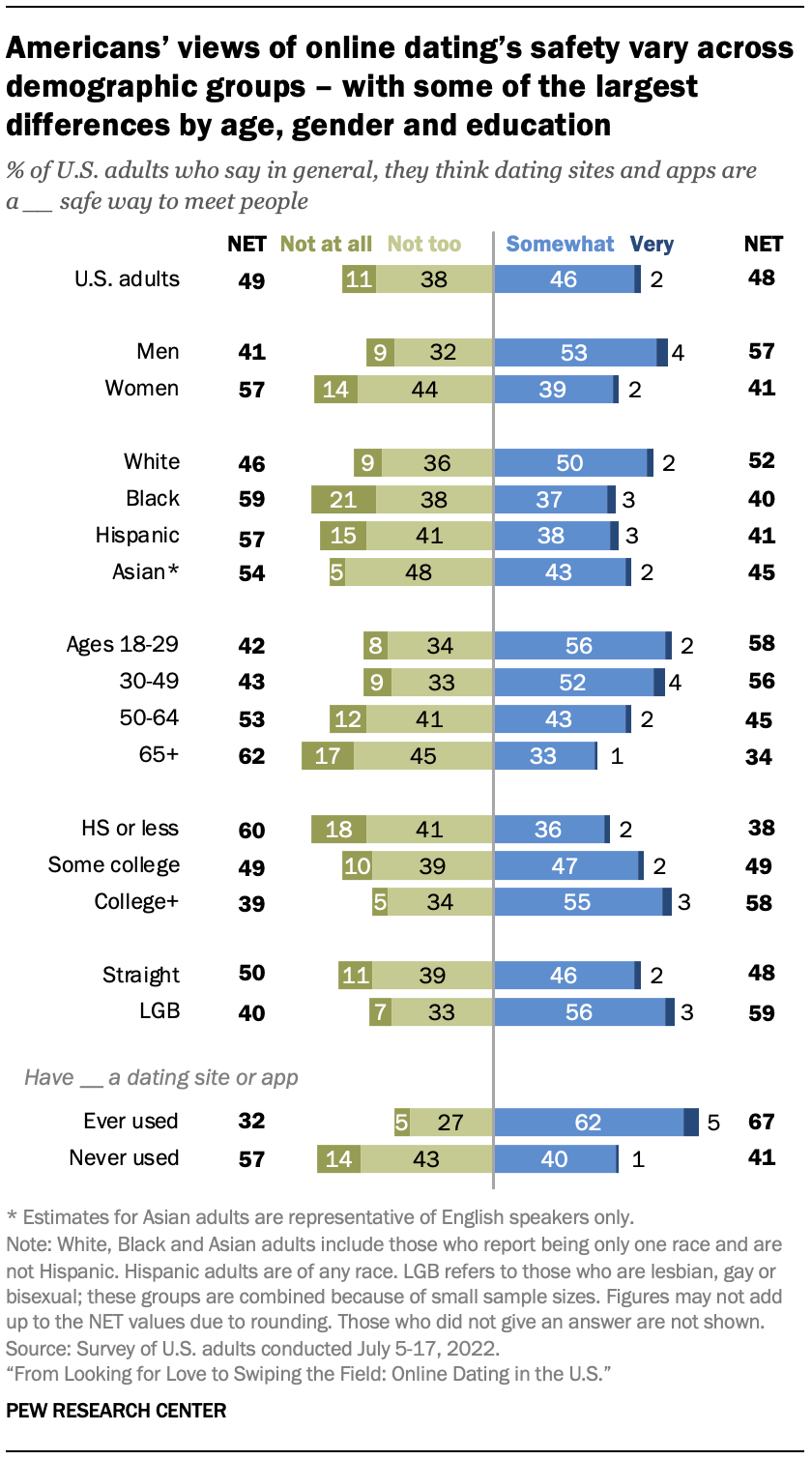
People are split when it comes to how safe they think dating sites and apps are: 48% say they are at least a somewhat safe way to meet people, while 49% say they are not too or not at all safe. This represents a slight dip in perceived safety from 2019, when 53% said dating sites and apps were a safe way to meet people.
Concerns about safety vary widely along demographic lines. For example, adults 65 and older are 20 points more likely than adults ages 18 to 49 to think online dating is not safe. They are also 9 points more likely than those 50 to 64 to say so.
Large differences are also present by gender, education and race and ethnicity. Women are 16 points more likely than men to say dating sites and apps are unsafe for meeting people. Those with a high school diploma or less are more likely to say online dating is unsafe (60%) versus those with some college experience (49%) or a bachelor’s degree or more (39%).
Black (59%) or Hispanic (57%) adults are also more likely to view online dating as unsafe compared with White adults (46%).
And while straight adults are about evenly divided on online dating’s safety, a majority of LGB adults say these platforms are a safe way to meet people.
There have been some slight changes in groups’ views of online dating’s safety since 2019. For example, the share of those with a bachelor’s degree or higher who say that online dating is a safe way to meet people is down 7 points from 65% in 2019. The share of Americans 65 and older who say this is down 6 points, from 40%. And the share of women who say online dating is safe is down 5 points from 46%, as is the share of White adults (from 57% to 52%).
A majority of online dating users think the platforms are safe for meeting people
Americans who have used dating sites and apps are far more likely than those who have not used them to see dating sites and apps as safe for meeting people. Two-thirds of those who have ever used a dating site or app say they are safe for this purpose. A smaller share of those who have never used one – about four-in-ten – say the platforms are a safe way to meet people. (While online dating users’ views are unchanged since 2019, those who have not used dating sites and apps are slightly less likely to think they are safe now than in 2019, when 47% said this.)
Among online dating users, there are also demographic differences in views of the platforms’ safety. For example, men who have used a dating site or app are more likely than women who have used one to see the platforms as safe (76% vs. 58%).
Feelings about safety are also related to negative experiences online dating. Those who have experienced at least one of the unwanted behaviors on a dating site or app that were explored in the survey are less likely to say online dating is safe than those who have not (64% vs. 72%).
But not all of the demographic differences in Americans’ views overall remain when looking just at online dating users. For example, while there are differences by sexual orientation in Americans’ views of online dating’s safety, among online dating users themselves, majorities of both LGB and straight users say it is safe (69% vs. 68%).
60% of U.S. adults favor requiring background checks for online dating profiles
In the wake of safety concerns from some users, some companies that run dating platforms have started offering background checks on profiles for users who want to vet potential matches on the sites. The survey explored whether Americans think these types of checks should be required before someone even creates a profile.
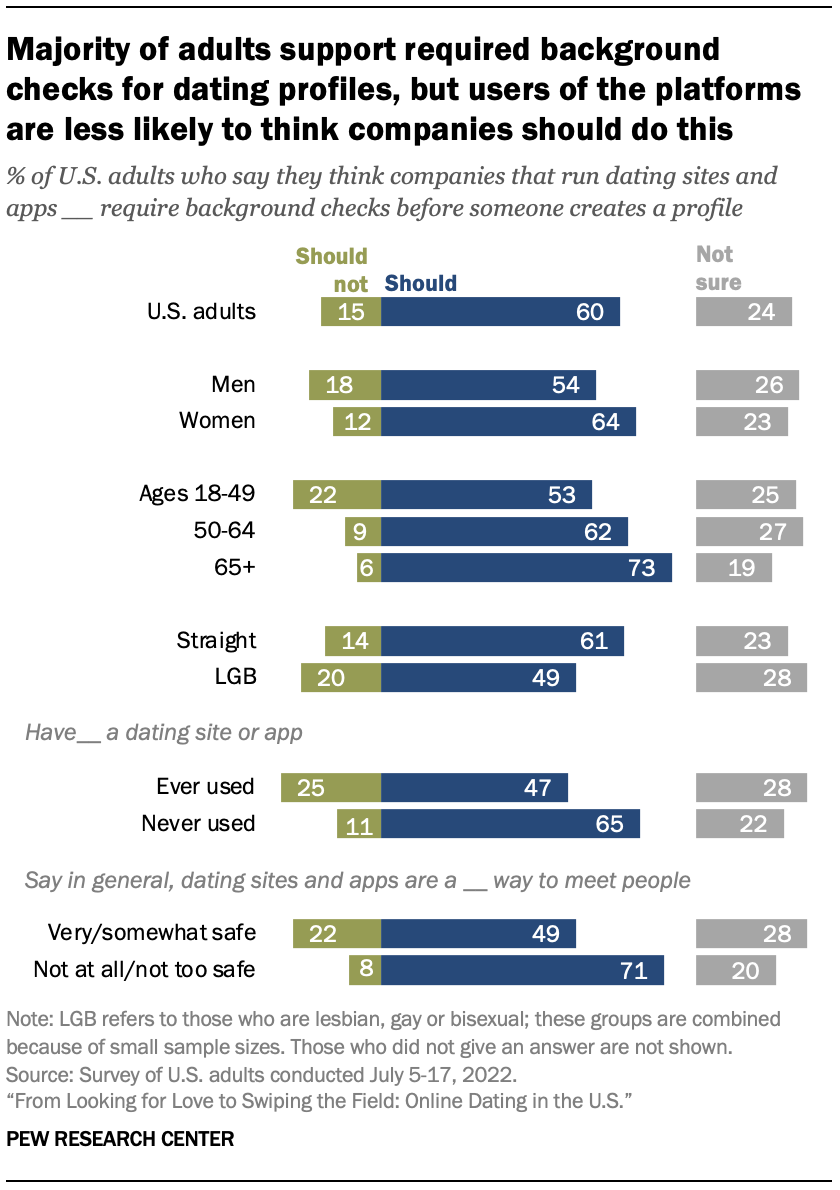
A majority of Americans support requiring users who want to create a profile to undergo a background check before doing so. Some 60% of Americans say companies should require this, 15% say they should not and 24% are not sure.
Adults 65 and older are more likely to favor mandated background checks than younger adults – 73% say companies should require them, followed by 62% of those 50 to 64 and 53% of adults younger than 50.
Views also differ sharply by perceptions of online dating’s safety, with those who say it’s not a safe way to meet people more likely to support required background checks than those who think it is safe (71% vs. 49%).
Women are more likely than men to say people should have to go through background checks (64% vs. 54%), as are straight adults compared with LGB adults (61% vs. 49%).
But online dating users themselves are not as supportive of this requirement. Some 47% say companies should require background checks, compared with 65% of those who have never used a dating site or app. Still, women online dating users are more likely to support this than their male counterparts (53% vs. 41%), and users who think the platforms are not safe for meeting people are more likely to say companies should require background checks than those who think they are safe (64% vs. 39%). There are no differences by sexual orientation among users (47% of straight users and 45% of LGB users say companies should require background checks).




